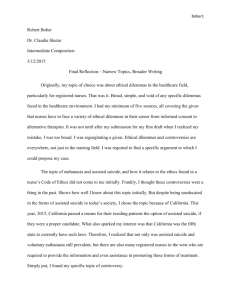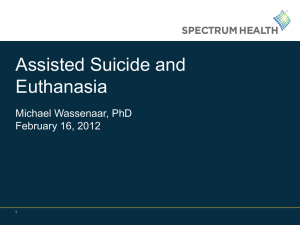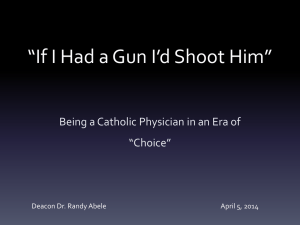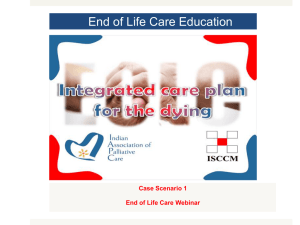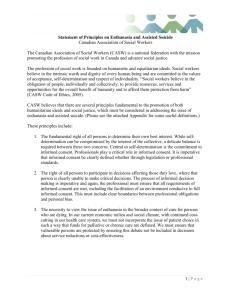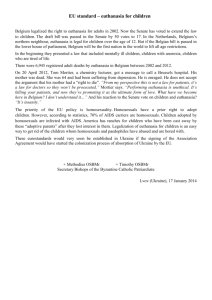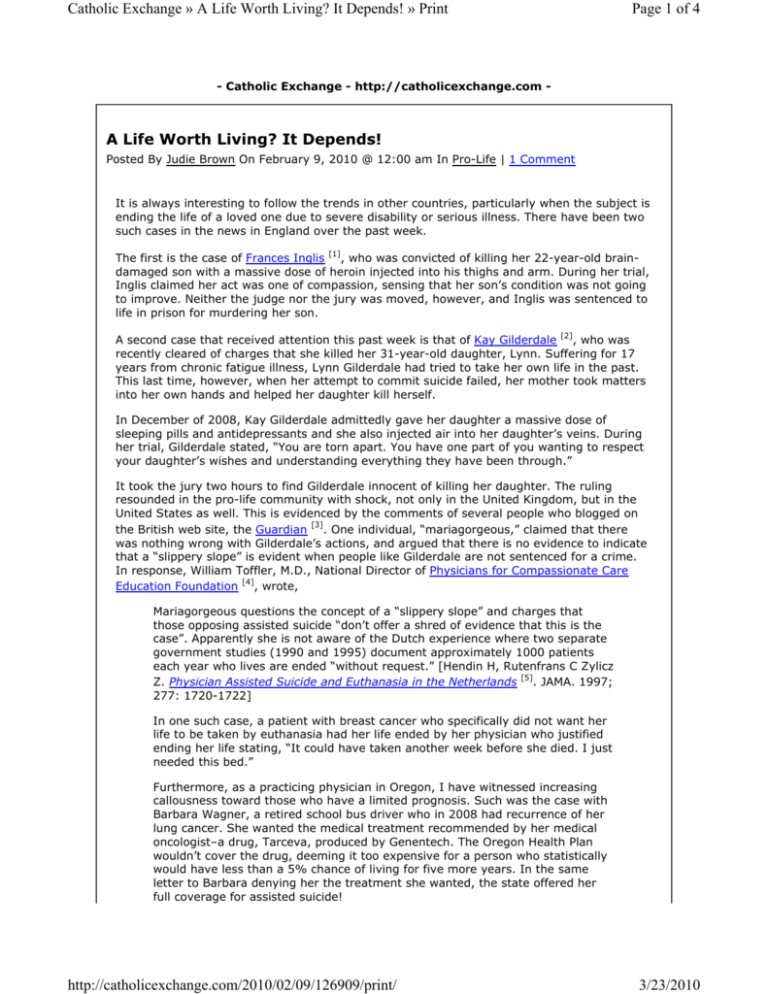
Catholic Exchange » A Life Worth Living? It Depends! » Print
Page 1 of 4
- Catholic Exchange - http://catholicexchange.com -
A Life Worth Living? It Depends!
Posted By Judie Brown On February 9, 2010 @ 12:00 am In Pro-Life | 1 Comment
It is always interesting to follow the trends in other countries, particularly when the subject is
ending the life of a loved one due to severe disability or serious illness. There have been two
such cases in the news in England over the past week.
The first is the case of Frances Inglis [1], who was convicted of killing her 22-year-old braindamaged son with a massive dose of heroin injected into his thighs and arm. During her trial,
Inglis claimed her act was one of compassion, sensing that her son’s condition was not going
to improve. Neither the judge nor the jury was moved, however, and Inglis was sentenced to
life in prison for murdering her son.
A second case that received attention this past week is that of Kay Gilderdale [2], who was
recently cleared of charges that she killed her 31-year-old daughter, Lynn. Suffering for 17
years from chronic fatigue illness, Lynn Gilderdale had tried to take her own life in the past.
This last time, however, when her attempt to commit suicide failed, her mother took matters
into her own hands and helped her daughter kill herself.
In December of 2008, Kay Gilderdale admittedly gave her daughter a massive dose of
sleeping pills and antidepressants and she also injected air into her daughter’s veins. During
her trial, Gilderdale stated, “You are torn apart. You have one part of you wanting to respect
your daughter’s wishes and understanding everything they have been through.”
It took the jury two hours to find Gilderdale innocent of killing her daughter. The ruling
resounded in the pro-life community with shock, not only in the United Kingdom, but in the
United States as well. This is evidenced by the comments of several people who blogged on
the British web site, the Guardian [3]. One individual, “mariagorgeous,” claimed that there
was nothing wrong with Gilderdale’s actions, and argued that there is no evidence to indicate
that a “slippery slope” is evident when people like Gilderdale are not sentenced for a crime.
In response, William Toffler, M.D., National Director of Physicians for Compassionate Care
Education Foundation [4], wrote,
Mariagorgeous questions the concept of a “slippery slope” and charges that
those opposing assisted suicide “don’t offer a shred of evidence that this is the
case”. Apparently she is not aware of the Dutch experience where two separate
government studies (1990 and 1995) document approximately 1000 patients
each year who lives are ended “without request.” [Hendin H, Rutenfrans C Zylicz
Z. Physician Assisted Suicide and Euthanasia in the Netherlands [5]. JAMA. 1997;
277: 1720-1722]
In one such case, a patient with breast cancer who specifically did not want her
life to be taken by euthanasia had her life ended by her physician who justified
ending her life stating, “It could have taken another week before she died. I just
needed this bed.”
Furthermore, as a practicing physician in Oregon, I have witnessed increasing
callousness toward those who have a limited prognosis. Such was the case with
Barbara Wagner, a retired school bus driver who in 2008 had recurrence of her
lung cancer. She wanted the medical treatment recommended by her medical
oncologist–a drug, Tarceva, produced by Genentech. The Oregon Health Plan
wouldn’t cover the drug, deeming it too expensive for a person who statistically
would have less than a 5% chance of living for five more years. In the same
letter to Barbara denying her the treatment she wanted, the state offered her
full coverage for assisted suicide!
http://catholicexchange.com/2010/02/09/126909/print/
3/23/2010
Catholic Exchange » A Life Worth Living? It Depends! » Print
Page 2 of 4
There is no doubt that proponents of such acts do not perceive any harm in them, nor do
they think that opposition to them is justified. It is quite clear that more and more citizens
are in agreement, which is why those in favor of such acts are making progress not only
when it comes to the severely disabled, but with those who are elderly or seriously ill.
Bernadine Healy [6], M.D., former director of the National Institutes of Health, recently
analyzed the end-of-life questions in the context of government-controlled health care
She points out:
[7]
.
One way to reduce spending is to move the incurably ill into palliative care.
Hospice is beloved for offering pain relief, comfort, and spiritual and emotional
support to the dying, mostly from cancer. But hospice spreads its wings more
broadly under health reform. Medicare will offer its services free to patients not
on their deathbed but in slow, irreversible decline due to failing hearts, lungs,
brains, or immune systems. This can be dicey: It’s hard to say, as hospice does
now, that death is not accelerated when patients with end-stage lung disease
get morphine or those with advanced Parkinson’s receive sleep-inducing drugs
for so-called terminal sedation. To some, this is a humane choice that also
conserves resources. To others, it is slow euthanasia.
Clearly, what lies ahead is not your parents’ Medicare but something new. A
place where government will trump doctors, and it will be sold as safer, better,
less wasteful care.
Note, please, that in the scenario Dr. Healy is suggesting, it would be a legitimate part of
health care reform to take actions similar to those of Inglis and Gilderdale. The startling
difference would be that such actions would not be crimes, but rather incorporated into the
national framework of a “right to privacy.” Obviously, helping someone die sooner than later
would be clinically practiced as part of a larger cost saving program as well. It’s rather
interesting that Dr. Healy would mention such things as terminal sedation, since this is the
very type of problem that has been publicly debated by many for years. It, as with any
medical practice, can be abused or totally legitimized for the wrong reasons. Think about
abortion.
Writer Mary Ann Kreitzer recently expounded on the subject based on the personal account of
what a friend experienced when her father was killed by terminal sedation, calling it “abortion
for the elderly [8].”
While it is clear that we pro-life apologists cannot condemn sedation across the board, it is
equally obvious that some degree of prudential judgment-that has nothing whatsoever to do
with cost saving or utilitarianism-has to come into practice. As Eric Chevlen, M.D. and pain
control expert, recently told Wesley J. Smith [9]:
In close to 30 years of practicing oncology and palliative care, I have treated
hundreds of patients with opioids to relieve pain, accepting some level of
sedation as an unavoidable side effect rather than the goal of therapy. But I can
recall only a handful of times in which I felt that the best way I could reduce the
patient’s suffering was to intentionally diminish his level of consciousness.
In addition, British oncologist Karol Sikora
[10]
, M.D., wrote,
In all my 37 years as a cancer doctor, I have never had a patient who asked for
euthanasia. In my line of work, it is not an issue. People don’t want to die. And,
usually, we can make patients comfortable, thanks to modern drugs.
Registered nurse Nancy Valko has warned of the abuses that come about when actions once
believed to be criminal in nature are slowly introduced into the practice of medicine as simple
steps that can “help” the suffering patient and his family. In her article, “Is Palliative Sedation
[11]
Becoming Another Form of Euthanasia?
“, she defines the strategy of the euthanasia
movement this way:
As assisted suicide bills have regularly failed in state legislatures in the years
since Oregon passed its assisted suicide law, euthanasia supporters have had to
http://catholicexchange.com/2010/02/09/126909/print/
3/23/2010
Catholic Exchange » A Life Worth Living? It Depends! » Print
Page 3 of 4
change tactics, although not their ultimate goal of choosing death as a
constitutional right. The outreach to medical groups like hospice and palliative
care organizations is particularly disturbing.
Euthanasia supporters have been successful in getting some medical and
nursing groups to change their official positions from opposition to assisted
suicide/euthanasia to neutrality on the issue. And now, almost all of the
mainstream media accepts death by withdrawal of treatment as humane and
legal for the severely brain-injured. It was just a matter of time before that
vulnerable group of people expanded to include people with lesser disabilities
and now even the fully conscious but terminally or “hopelessly” ill person.
But as everyone really knows, it is virtually impossible to starve and dehydrate
to death painlessly. The idea of terminal sedation to make such a death possible
thus becomes essential to the process.
[State legislative proposals] are not only incremental steps to the goal of
legalizing euthanasia. They are also a crucial part of the effort of “right-to-die”
groups to reeducate the public, especially doctors and nurses. … When an
induced coma with self-starvation and dehydration is seen as proper medical
treatment for anyone, the whole rationale of ethical health care is turned on its
head.
When medically vulnerable people are given the option of a legal, doctorassisted premature death, can we be surprised when we discover that none of
us is permanently safe from the same fate?
When is a life worth living? It depends …
In a society where the human dignity of each individual without exception is respected in the
law and the culture, such a question would not even be asked.
This article is courtesy of the American Life League.
1 Comment To "A Life Worth Living? It Depends!"
1 Comment (Open | Close)
#1 Pingback By Twitter Trackbacks for A Life Worth Living? It Depends! | Catholic Exchange
[catholicexchange.com] on Topsy.com On February 9, 2010 @ 8:40 am
[...] A Life Worth Living? It Depends! | Catholic Exchange catholicexchange.com/2010/02/09/126909 –
view page – cached It is always interesting to follow the trends in other countries, particularly when the
subject is ending the life of a loved one due to severe disability or [...]
Article printed from Catholic Exchange: http://catholicexchange.com
URL to article: http://catholicexchange.com/2010/02/09/126909/
URLs in this post:
[1] Frances Inglis: http://blogs.telegraph.co.uk/news/georgepitcher/100023240/murdererfrances-inglis-might-expect-mercy-in-sentencing-but-not-in-her-conviction/
[2] Kay Gilderdale:
http://www.telegraph.co.uk/news/newstopics/politics/lawandorder/7074532/Kay-Gilderdalewatching-my-daughter-die-was-like-having-my-heart-ripped-out.html
[3] Guardian: http://www.guardian.co.uk/society/joepublic/2010/feb/04/assisted-dying-radar
[4] Physicians for Compassionate Care Education Foundation: http://www.pccef.org/
http://catholicexchange.com/2010/02/09/126909/print/
3/23/2010
Catholic Exchange » A Life Worth Living? It Depends! » Print
Page 4 of 4
[5] Physician Assisted Suicide and Euthanasia in the Netherlands: http://jama.amaassn.org/cgi/content/summary/277/21/1720?
ijkey=24076388a0f21f01ea0aa073f76de04258045469&keytype2=tf_ipsecsha
[6] Bernadine Healy: http://www.usnews.com/topics/author/bernadine_healy
[7] government-controlled health care: http://www.usnews.com/articles/health/bernadinehealy/2010/01/06/medicare-after-health-reform-not-your-parents-plan.html
[8] abortion for the elderly: http://lesfemmes-thetruth.blogspot.com/2010/01/terminal-sedationabortion-for-elderly.html
[9] Wesley J. Smith: http://article.nationalreview.com/410156/hazardous-pathway/wesley-jsmith
[10] Karol Sikora: http://www.dailymail.co.uk/debate/article-1248090/In-37-years-cancerdoctor-Ive-patient-asked-euthanasia.html
[11] Is Palliative Sedation Becoming Another Form of Euthanasia?:
http://lifeissues.net/writers/val/val_33palliativesedationeuth.html
Copyright © 2009 Catholic Exchange. All rights reserved.
http://catholicexchange.com/2010/02/09/126909/print/
3/23/2010

